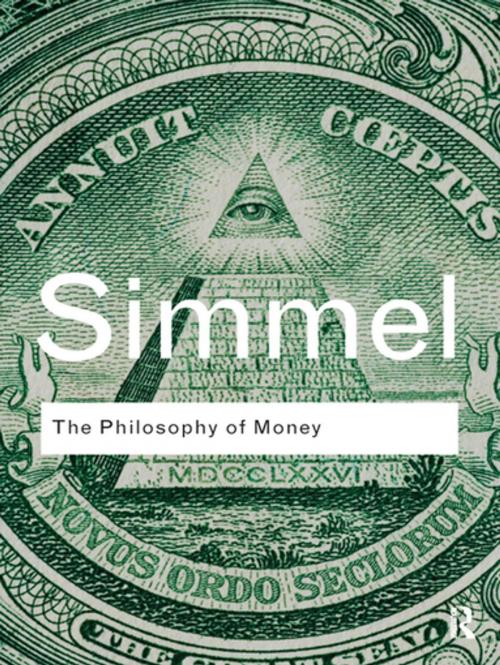| Author: | Georg Simmel | ISBN: | 9781136807312 |
| Publisher: | Taylor and Francis | Publication: | April 1, 2011 |
| Imprint: | Routledge | Language: | English |
| Author: | Georg Simmel |
| ISBN: | 9781136807312 |
| Publisher: | Taylor and Francis |
| Publication: | April 1, 2011 |
| Imprint: | Routledge |
| Language: | English |
With a new foreword by Charles Lemert
'Its greatness...lies in ceaseless and varied use of the money form to unearth and conceptually reveal incommensurabilities of all kinds, in social reality fully as much as in thought itself.' - Fredric Jameson
In The Philosophy of Money, Georg Simmel puts money on the couch. He provides us with a classic analysis of the social, psychological and philosophical aspects of the money economy, full of brilliant insights into the forms that social relationships take. He analyzes the relationships of money to exchange, human personality, the position of women, and individual freedom. Simmel also offers us prophetic insights into the consequences of the modern money economy and the division of labour, in particular the processes of alienation and reification in work and urban life.
An immense and profound piece of work it demands to be read today and for years to come as a stunning account of the meaning, use and culture of money.
Georg Simmel (1858-1918) was born in Berlin, the youngest of seven children. He studied philosophy and history at the University of Berlin and was one of the first generation of great German sociologists that included Max Weber.
With a new foreword by Charles Lemert
'Its greatness...lies in ceaseless and varied use of the money form to unearth and conceptually reveal incommensurabilities of all kinds, in social reality fully as much as in thought itself.' - Fredric Jameson
In The Philosophy of Money, Georg Simmel puts money on the couch. He provides us with a classic analysis of the social, psychological and philosophical aspects of the money economy, full of brilliant insights into the forms that social relationships take. He analyzes the relationships of money to exchange, human personality, the position of women, and individual freedom. Simmel also offers us prophetic insights into the consequences of the modern money economy and the division of labour, in particular the processes of alienation and reification in work and urban life.
An immense and profound piece of work it demands to be read today and for years to come as a stunning account of the meaning, use and culture of money.
Georg Simmel (1858-1918) was born in Berlin, the youngest of seven children. He studied philosophy and history at the University of Berlin and was one of the first generation of great German sociologists that included Max Weber.















